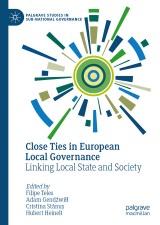Details

Close Ties in European Local Governance
Linking Local State and SocietyPalgrave Studies in Sub-National Governance
|
160,49 € |
|
| Verlag: | Palgrave Macmillan |
| Format: | |
| Veröffentl.: | 01.09.2020 |
| ISBN/EAN: | 9783030447946 |
| Sprache: | englisch |
Dieses eBook enthält ein Wasserzeichen.
Beschreibungen
This book develops and tests a typology of local state-society relations. To deliver such a comparative study on institutionalized relations between local government and societal actors at the municipal level in Europe, the book identifies and classifies country-specific patterns of these institutionalized governance networks. This work explores the diversity within these institutionalized networks, approaching it from a strong comparative perspective that is anchored on a new typology allowing a more robust analysis of the identifiable patterns. It is a study with appeal to scholars and students of local government, public administration and political science as well as to those pursuing this debate and implementing similar agendas as practitioners.<div><br></div>
1. Interactions of societal actors and local government in institutionalized governance arrangements: the book's scope and content.- 2. Diversity in local state-society relations: A typology to grasp differences in institutional networks.- 3. How to measure the autonomy, coherence and relevance of local state-society relations?.- 4. Local state- society relations in Austria.- 5. Local state- society relations in Flanders (Belgium).- 6. Local state- society relations in Croatia.- 7. Local state- society relations in Czech Republic.- 8. Local state- society relations England.- 9. Local state- society relations in Finland.- 10. Local state- society relations in France.- 11. Local state- society relations in Germany.- 12. Local state- society relations in Greece.- 13. Local state- society relations in Iceland.- 14. Local state- society relations in Ireland.- 15. Local state- society relations in Italy.- 16. Local state- society relations in Latvia.- 17. Local state- society relations in Lithuania.- 18. Local state- society relations in Netherlands.- 19. Local state- society relations in Norway.- 20. Local state- society relations in Poland.- 21. Local state- society relations in Portugal.- 22. Local state- society relations in Romania.- 23. Local state- society relations in Spain.- 24. Local state- society relations in Sweden.- 25. Local state- society relations in Switzerland.- 26. Local state- society relations in European countries: Main findings.
<div><b>Filipe Teles</b> is Assistant Professor at the Department of Social, Political and Territorial Sciences at the University of Aveiro, Portugal. He is a local governance specialist and member of the Research Unit on Governance, Competitiveness and Public Policy. </div><div><br></div><div><b>Adam Gendźwiłł</b> is Assistant Professor of Political Science and Human Geography at the University of Warsaw, Poland. His research interests include local democracy (with particular focus on local elections) and territorial reforms in a comparative perspective. </div><div><br></div><b>Cristina St</b><b>ă</b><b>nus </b>is Associate Professor of Political Science at the Lucian Blaga University of Sibiu, Romania. Her research interests focus on the study of Romanian local government and politics in a comparative context and the governance of public service delivery. <div><br></div><div><b>Hubert Heinelt </b>is Emeritus Professor of Public Administration, Public Policy and Urban Research at the Institute for Political Science, Technische Universität Darmstadt, Germany. His research covers various policies in multi-level systems. </div>
<div>This book develops and tests a typology of local state-society relations. To deliver such a comparative study on institutionalized relations between local government and societal actors at the municipal level in Europe, the book identifies and classifies country-specific patterns of these institutionalized governance networks. This work explores the diversity within these institutionalized networks, approaching it from a strong comparative perspective that is anchored on a new typology allowing a more robust analysis of the identifiable patterns. It is a study with appeal to scholars and students of local government, public administration and political science as well as to those pursuing this debate and implementing similar agendas as practitioners.<br></div><div><br></div><div><div><b>Filipe Teles</b> is Assistant Professor at the Department of Social, Political and Territorial Sciences at the University of Aveiro, Portugal. </div><div><br></div><div><b>Adam Gendźwiłł</b> is Assistant Professor of Political Science and Human Geography at the University of Warsaw, Poland.</div><div><br></div><div><b>Cristina St</b><b>ă</b><b>nus </b>is Associate Professor of Political Science at the Lucian Blaga University of Sibiu, Romania. </div><div><br></div><div><b>Hubert Heinelt </b>is Emeritus Professor of Public Administration, Public Policy and Urban Research at the Institute for Political Science, Technische Universität Darmstadt, Germany.</div></div>
Explores diversity in institutional networks of local governance in Europe Provides analytical tools to understand types of local-state society relations in several European countries Challenges conventional approaches to local government diversity and enhances knowledge regarding the role of citizens' engagement in policy networks at the local level

















